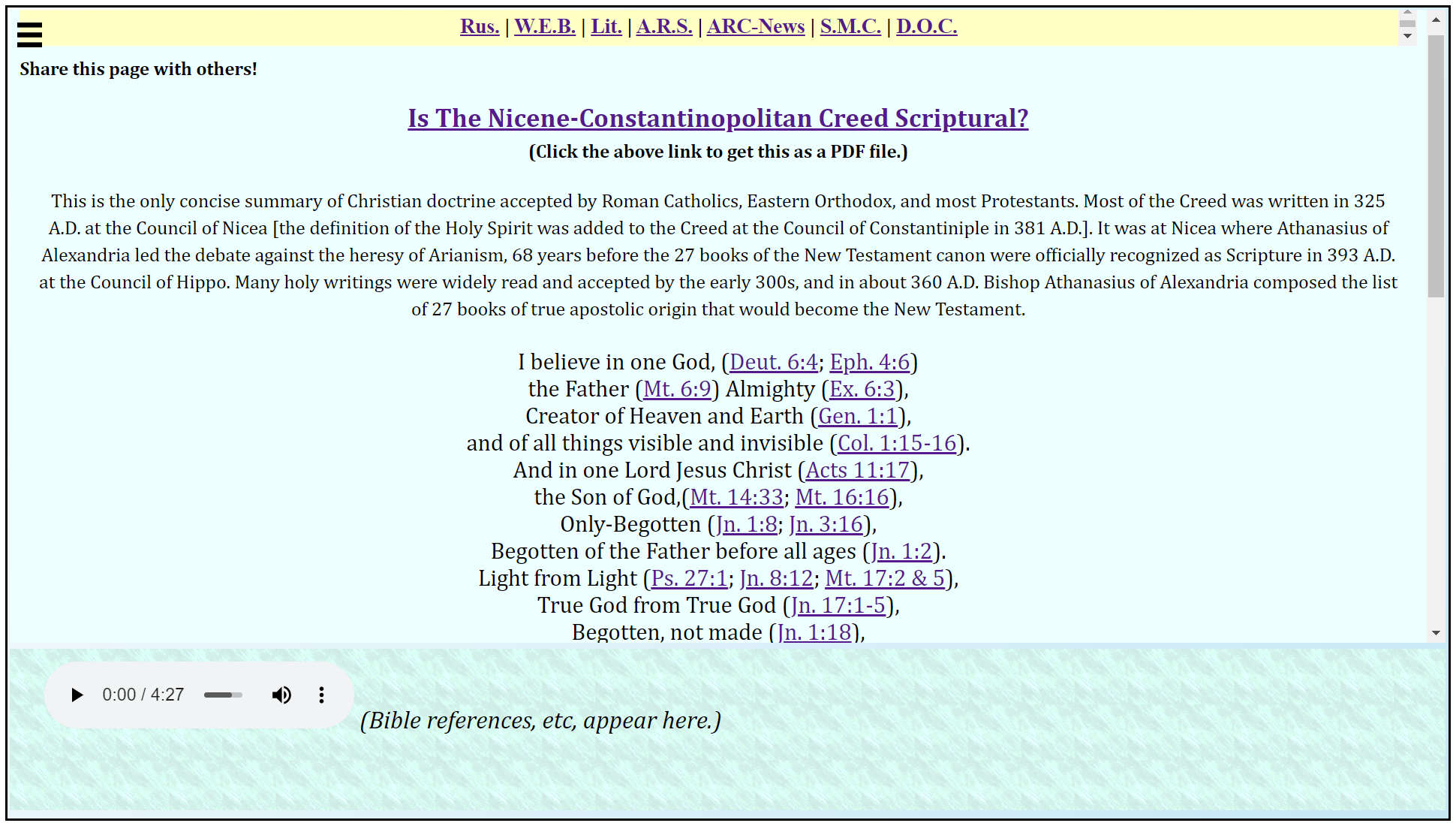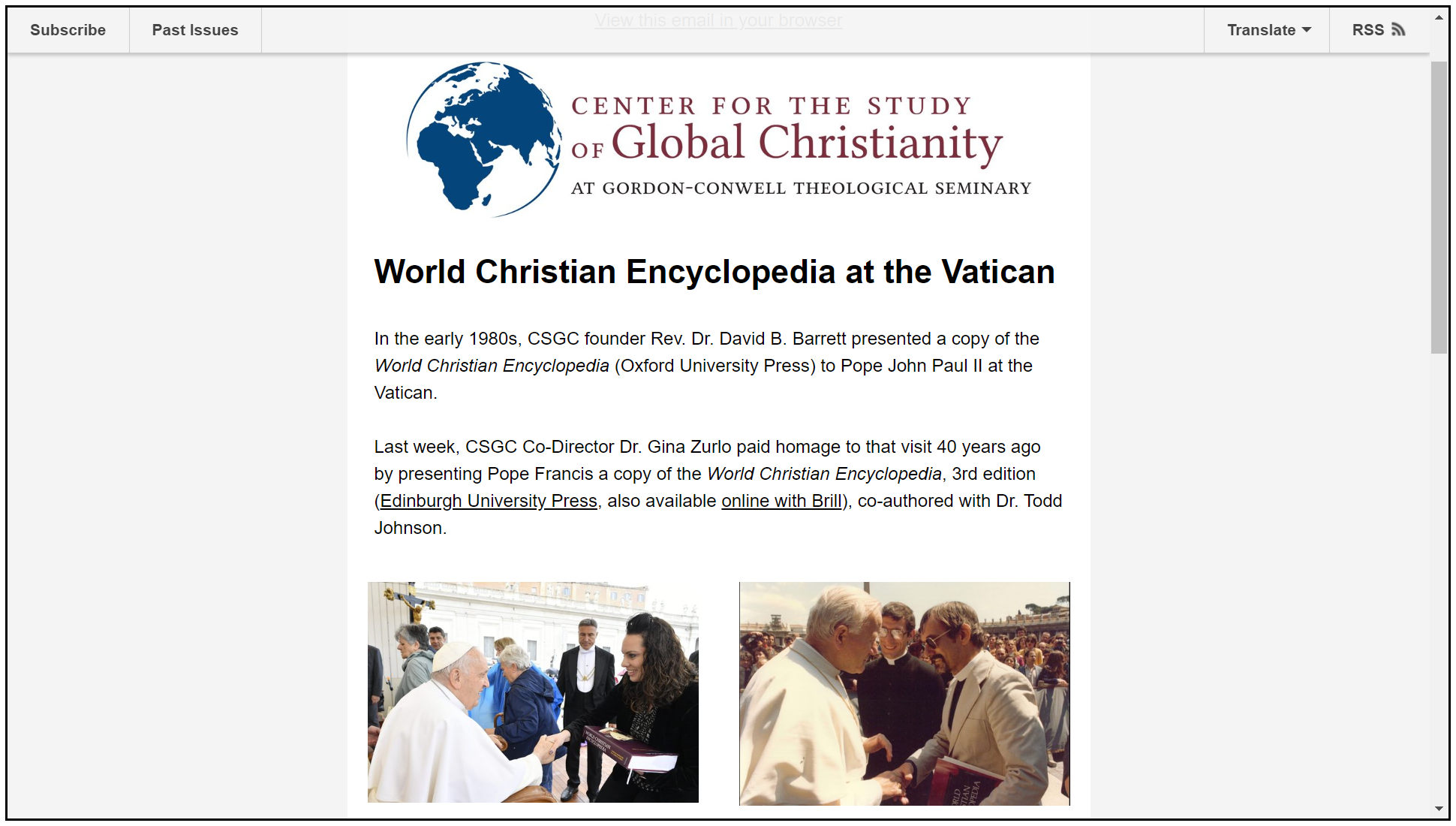IS THE NICENE-CONSTANTINOPOLITAN CREED SCRIPTURAL?
 Read "Is The Nicene-Constantinopolitan Creed Scriptural?" online, or get it as a PDF, 2 pages. The online version links to the Scripture references for each word or phrase in the Creed which affirm that this concise summary of Christian doctrine, accepted by Roman Catholics, Eastern Orthodox, and most Protestants, is indeed Scriptural!
Read "Is The Nicene-Constantinopolitan Creed Scriptural?" online, or get it as a PDF, 2 pages. The online version links to the Scripture references for each word or phrase in the Creed which affirm that this concise summary of Christian doctrine, accepted by Roman Catholics, Eastern Orthodox, and most Protestants, is indeed Scriptural!
Most of the Creed was written in 325 A.D. at the Council of Nicea [the definition of the Holy Spirit was added to the Creed at the Council of Constantiniple in 381 A.D.]. It was at Nicea where Athanasius of Alexandria led the debate against the heresy of Arianism, 68 years before the 27 books of the New Testament canon were officially recognized as Scripture in 393 A.D. at the Council of Hippo. Many holy writings were widely read and accepted by the early 300s, and in about 360 A.D. that same Athanasius, now Bishop of Alexandria, composed the list of 27 books of true apostolic origin that would become the New Testament.
So when people say – "I only believe in the Bible, not human tradition!" – thereby denigrating the holy men of God who rightly interpreted Scripture, they are putting down the very same holy men of God who decided which writings were inspired Scripture! The issue isn't Scripture vs. tradition, but rather Holy Tradition being the correct interpretation of Scripture. This Creed has been a unifying factor for Orthodox Christians over the past 18 centuries. But sadly, disunity creeps in due to all-too-human ethnic pride, lusts, and greed.
 As you may know, ever since Russia's greedy 2014 invasion of Ukraine's Donbas region and takeover of Crimea, I have been following closely and reporting on events in Ukraine in my newsletters and social media posts to tens of thousands of readers. In early 2018, I was asked to write an article about religion in Ukraine for an upcoming edition of the World Christian Encyclopedia.
As you may know, ever since Russia's greedy 2014 invasion of Ukraine's Donbas region and takeover of Crimea, I have been following closely and reporting on events in Ukraine in my newsletters and social media posts to tens of thousands of readers. In early 2018, I was asked to write an article about religion in Ukraine for an upcoming edition of the World Christian Encyclopedia.
In May 2023, a copy of the World Christian Encyclopedia, Third Edition was presented to Pope Francis in Rome. There's much in it about the Carpatho-Russian Church. The date of my last draft of the article was dated "June 8, 2018" which is before the Ecumenical Patriarch issued the Tomos of Autocephaly to the Orthodox Church of Ukraine in December 2018.
The published article, with photos and maps added, is dated April 4, 2019. You'll note that at the end of this final version of the article (just before the bibliography), it says – "Contributions by Anatole Glukhovskyy and Robert Hosken" but as you'll see by comparing my draft with the published article, most of it is my work, as the June 2018 draft indicates.
The religious basis for the current war in Ukraine goes very deep: Two Greek Orthodox Christian brothers, Methodius and Cyril (after whom the Cyrillic alphabet is named), who lived in Crimea – at that time part of the Greco-Roman Empire – had learned the Scythian language spoken by proto-Slavic peoples just north of Crimea. These two brothers were sent to evangelize the Scythians. In 988 A.D., over 1,000 years ago, Prince Vladimir was converted to Orthodox Christianity and had the whole nation of ancient Rus' based in Kyiv baptized in the Dnipro River. At that time, Moscow was just a small village on the side of a river. Only about 200 years later did the principality of "Muscovy" – the territory ruled by Moscow's princes – grow big enough to fight against and conquer Kyiv, eventually shifting the center of Slavic Christianity to Moscow and renaming itself as "Russia." So this religious rivalry between the two capitals is almost 900 years old by now.
Go to ARC-News to read our free e-newsletters and Subscribe!

No comments:
Post a Comment